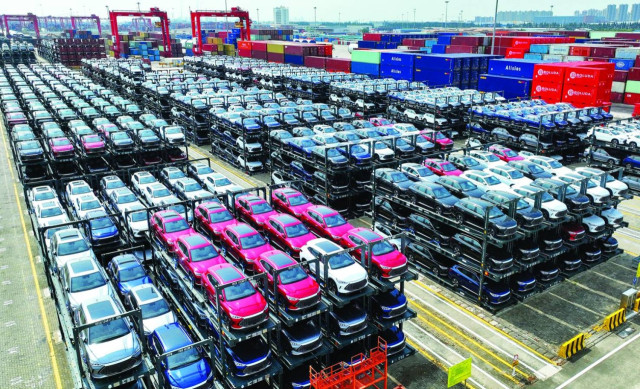The European Commission said it will impose extra duties of up to 38.1% on imported Chinese electric cars from July, risking retaliation from Beijing which said on Wednesday it would take measures to safeguard its interests.
The Commission said it would apply an additional 21% for companies deemed to have cooperated with the investigation and 38.1% for those it said had not, according to Reuters.
In return, the Chinese Foreign Ministry said Beijing would take all necessary measures to “firmly safeguard” its legitimate rights and interests.
Chinese foreign ministry spokesperson Lin Jian said the EU's investigation was a “typical case of protectionism” and tariffs would damage China-EU economic cooperation and the stability of the global automobile production and supply chains.
“We urge the EU to act on its commitment to supporting free trade and opposing protectionism, and work with us to uphold the overall economic and trade cooperation between the two sides. China will take all measures necessary to firmly defend our lawful rights and interests,” Jian said.
Meanwhile, Chinese electric vehicle maker Nio strongly opposed the European Union's use of increased tariffs as a strategy to obstruct the normal global electric vehicle trade but its commitment to Europe's EV market is unwavering, it said on Wednesday.
Nio “will continue to serve our users and explore new opportunities within Europe despite protectionism,” it said in a statement.
The European Automobile Manufacturers’ Association (ACEA) said free and fair trade is essential in creating a globally competitive European automotive industry.
“Most important for global competitiveness however is a robust industrial strategy for electromobility,” ACEA added.
US Consumers Score $1 Billion in EV Tax Credits
In a related development, the Treasury Department announced Wednesday that there have been more than 125,000 new EVs purchased, along with about 25,000 used EVs, and buyers of EVs have saved more than $1 billion in upfront costs since the start of the year.
Starting on January 1st, 2024, taxpayers in the US have been able to take advantage of both the used and new clean vehicle tax credits when they purchase their vehicle at participating dealerships, thanks to new guidance from the administration of President Joe Biden.
Deputy Treasury Secretary Wally Adeyemo told reporters the $1 billion figure represents a “major milestone in the administration’s work to lower transportation costs for Americans.”
Adeyemo was asked about Republican criticism that the EV tax credit is flowing to relatively well-off Americans. GOP Sen. Thom Tillis of North Carolina, for example, said last month that it’s going to “people of means” and it doesn’t resonate with “the people growing up in the trailer park that I grew up in.”
Adeyemo said in response that the EV tax credit “provides hardworking Americans below a certain income threshold with an opportunity to buy a car for less money, and then to save money in terms of paying for gas.”
He said Americans have been telling him their No. 1 concern is reducing costs, and the credit “helps to reduce those costs,” and that “matters to Americans in all parts of the country.”
For a new EV, the annual-income limits for the credit are $150,000 for individuals and $300,000 for married couples, and for a used one, they’re at $75,000 for individuals and $150,000 for couples, according to the Internal Revenue Service.
Median household income in the US was $74,580 in 2022, according to the Census Bureau.
Besides income, qualifying for credits also depends on the price of the vehicle, as well as its battery materials and whether it’s assembled in North America.
Republicans are expected to make an effort to roll back EV tax credits, which stem from the Democrats’ Inflation Reduction Act of 2022, if the GOP has sufficient gains in November’s elections.




















